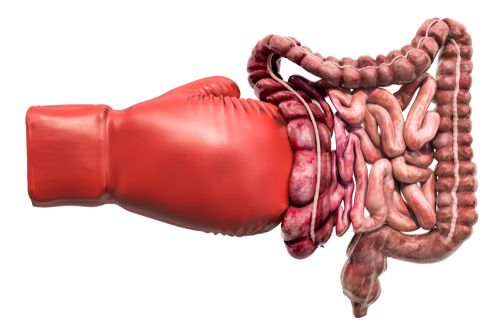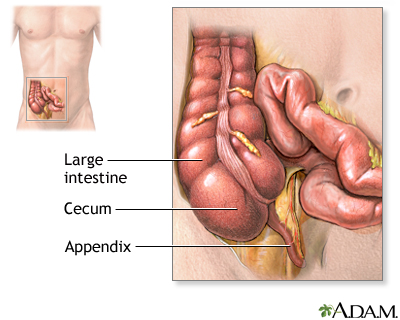
It is important to note that a tear may not always cause the intestinal contents to spill out into the abdominal cavity. This may lead to a condition known as peritonitis. It can then result in irritation of the lining around the organs (the peritoneum) or even lead to an infection. If the bowels rupture or a tear forms in it, then some of these substances (food, fluid, digestive enzymes), bacteria and stool can empty into the abdominal cavity. Eventually stool is expelled through the anus. In addition the walls contain small muscle which contract and relax in a rhythmic manner to push the intestinal contents. The walls of the intestines separate the internal intestinal environment from the abdominal cavity. In addition there is large amounts of microorganisms, specifically bacteria, in the lower parts of the small intestine and throughout the large intestine. The intestines contain a host of different substances, ranging from the remnants of consumed foods and beverages to digestive enzymes and wastes. If the weakening is severe or the disease extends through the bowel wall, it can eventually lead to a perforation.

This can occur with various diseases and disorders involving the intestines (bowels). Most of the time a burst bowel arises when a portion of the bowel wall is weakened. However, this is the not the most common cause.

This includes the digestion and absorption of nutrients, movement of intestinal contents towards the rectum and anus as well as preventing the intestinal contents from making contact with the other organs and structures of the abdominal cavity.Ī penetrating injury to the abdomen which pierces the bowels is the most obvious cause of a burst bowel. Each layer plays a different role in ensuring that the bowel is able to complete its functions. The bowel walls are relatively thick with several layers. The distance of this intestinal transit is about 7 meters (25 feet) which is the combined length of the small and large intestines. It carries partially digested food from the stomach through a windy path during which it is digested further and water and wastes added before stool is passed out of the rectum. The small and large intestines (bowels) are the longest parts of the gastrointestinal tract.


 0 kommentar(er)
0 kommentar(er)
